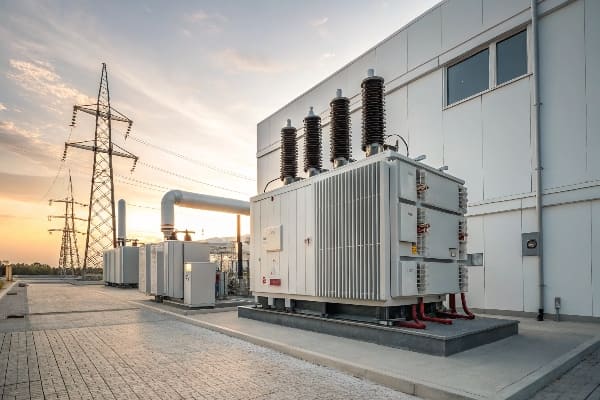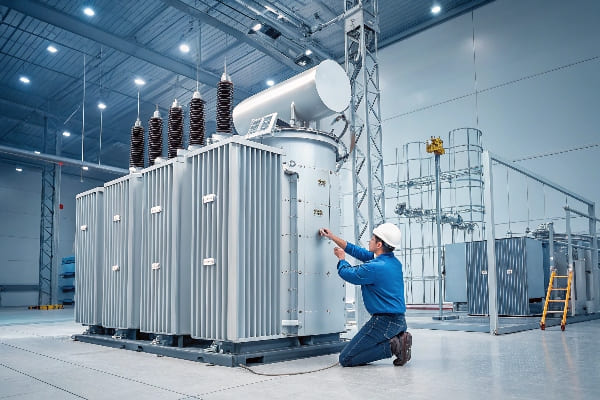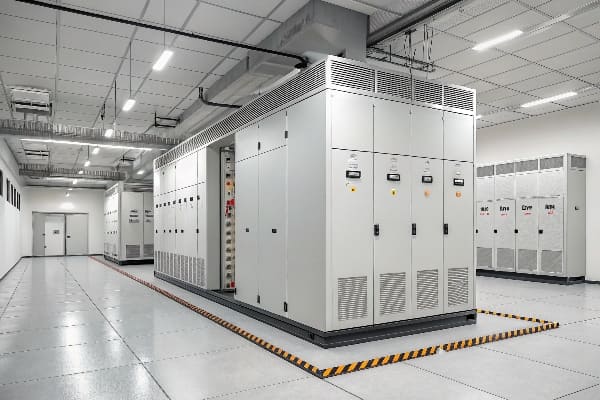What is a dry type transformer?
Are you tired of worrying about oil leaks and fire hazards in your electrical system? There’s a solution that might put your mind at ease.
A dry type transformer is an electrical transformer that uses air as its cooling medium instead of oil. It’s designed for indoor use, offering enhanced safety, reduced maintenance, and environmental benefits compared to traditional oil-filled transformers.

Let’s dive deeper into the world of dry type transformers and discover why they might be the perfect fit for your electrical needs.
What is a dry type transformer used for?
Have you ever wondered how large buildings manage their complex electrical systems safely? The answer often lies in dry type transformers.
Dry type transformers are used in various applications where safety, reliability, and environmental concerns are paramount. They’re commonly found in commercial buildings, industrial facilities, renewable energy systems, and areas where fire safety is critical.

Common Applications
In my years of experience with transformer installations, I’ve seen dry type transformers used in numerous settings:
- Commercial Buildings: Office complexes, shopping malls, and hotels often use dry type transformers due to their safety features and low maintenance requirements.
- Healthcare Facilities: Hospitals and clinics prefer dry type transformers for their reliability and reduced fire risk.
- Educational Institutions: Schools and universities use them to ensure a safe environment for students and staff.
- Industrial Plants: Many factories and processing plants choose dry type transformers for their durability and ability to withstand harsh environments.
Specific Use Cases
Let’s break down some specific scenarios where dry type transformers shine:
| Application | Reason for Use |
|---|---|
| Data Centers | Low fire risk, high reliability |
| Offshore Platforms | Compact size, no risk of oil spills |
| Renewable Energy | Used in wind turbines and solar installations |
| Underground Facilities | No oil leakage concerns |
Technical Advantages
Dry type transformers offer several technical benefits that make them suitable for these applications:
- Voltage Regulation: They provide excellent voltage regulation, which is crucial for sensitive electronic equipment.
- Overload Capacity: Many dry type transformers can handle short-term overloads without significant degradation.
- Noise Reduction: They generally operate more quietly than oil-filled transformers, making them ideal for indoor use.
- Customization: Dry type transformers can be easily customized for specific voltage requirements and installation constraints.
Environmental Considerations
The environmental benefits of dry type transformers are significant:
- No Oil: There’s no risk of oil leaks or spills, which can be environmentally damaging.
- Recyclability: At the end of their life, dry type transformers are easier to recycle than oil-filled ones.
- Energy Efficiency: Many modern dry type transformers are designed for high energy efficiency, reducing overall power consumption.
What is the life expectancy of a dry type transformer?
Are you wondering if investing in a dry type transformer is worth it in the long run? Let’s talk about their durability and longevity.
The life expectancy of a dry type transformer typically ranges from 20 to 30 years, with some well-maintained units lasting even longer. This longevity depends on factors such as operating conditions, maintenance practices, and environmental factors.

Factors Affecting Lifespan
From my experience, several key factors influence the life expectancy of dry type transformers:
- Operating Temperature: Excessive heat can degrade insulation materials over time.
- Load Profile: Consistent overloading can shorten the transformer’s life.
- Environmental Conditions: Humidity, dust, and chemical contaminants can affect performance and longevity.
- Maintenance Practices: Regular inspections and proper care can significantly extend a transformer’s life.
Lifespan Comparison
Let’s compare the lifespan of dry type transformers with other types:
| Transformer Type | Average Lifespan | Factors Influencing Lifespan |
|---|---|---|
| Dry Type | 20-30 years | Temperature, load, environment |
| Oil-Filled | 30-40 years | Oil quality, maintenance |
| Cast Resin | 25-35 years | Environmental conditions |
Maintenance for Longevity
To maximize the life of a dry type transformer, I recommend the following maintenance practices:
- Regular Inspections: Conduct visual inspections at least annually.
- Cleaning: Remove dust and debris that can impede cooling.
- Temperature Monitoring: Install temperature sensors to prevent overheating.
- Load Management: Avoid prolonged overloading situations.
- Environmental Control: Ensure proper ventilation and humidity control in the installation area.
Signs of Aging
It’s important to recognize signs that a dry type transformer is nearing the end of its life:
- Increased Noise: Unusual buzzing or humming can indicate deteriorating insulation.
- Higher Operating Temperatures: If the transformer runs hotter than usual, it may be losing efficiency.
- Visible Damage: Cracks or discoloration on insulation materials are red flags.
- Decreased Performance: If voltage regulation becomes poor, it might be time for replacement.
Economic Considerations
When considering the lifespan of a dry type transformer, it’s crucial to think about the total cost of ownership:
- Initial Investment: Dry type transformers may have a higher upfront cost.
- Operational Costs: They often have lower losses, reducing energy costs over time.
- Maintenance Expenses: Generally lower than oil-filled transformers due to simpler maintenance requirements.
- Replacement Planning: Factor in the cost of replacement when the transformer reaches the end of its life.
Why are dry type transformers more popular?
Are you curious about the growing trend in electrical systems? Dry type transformers are gaining ground, and for good reasons.
Dry type transformers are becoming more popular due to their safety features, environmental benefits, low maintenance requirements, and suitability for indoor installations. They offer a compelling combination of reliability, efficiency, and reduced fire risk.

Safety Advantages
Safety is a top priority in any electrical system, and dry type transformers excel in this area:
- Fire Resistance: With no oil, the risk of fire is significantly reduced.
- No Leakage Risk: There’s no chance of oil leaks, which can be hazardous and environmentally damaging.
- Indoor Use: They can be safely installed close to the load center, even in populated areas.
Environmental Benefits
In today’s eco-conscious world, the environmental advantages of dry type transformers are hard to ignore:
| Aspect | Benefit |
|---|---|
| No Oil | Eliminates risk of soil and water contamination |
| Recyclability | Easier to recycle at end of life |
| Energy Efficiency | Many models offer high efficiency, reducing energy consumption |
Maintenance Simplicity
As someone who has worked with various transformer types, I can attest to the maintenance benefits of dry type transformers:
- No Oil Checks: There’s no need for regular oil testing or replacement.
- Simpler Inspections: Visual inspections are straightforward and don’t require specialized equipment.
- Reduced Downtime: Maintenance can often be performed without taking the transformer offline.
Space Efficiency
Dry type transformers offer significant advantages in terms of space utilization:
- Compact Design: They often have a smaller footprint than equivalent oil-filled transformers.
- Flexible Installation: Can be installed in various orientations, including vertically.
- No Fire Walls: In many cases, expensive fire walls are not required, saving space and cost.
Regulatory Compliance
The increasing popularity of dry type transformers is partly driven by regulatory factors:
- Stricter Fire Codes: Many jurisdictions have tightened fire safety regulations, favoring dry type transformers.
- Environmental Regulations: Concerns about oil spills have led to preferences for oil-free alternatives.
- Energy Efficiency Standards: Some dry type transformers meet or exceed new efficiency standards more easily.
Cost Considerations
While the initial cost may be higher, dry type transformers often prove economical in the long run:
- Lower Installation Costs: No need for oil containment systems or extensive fire suppression.
- Reduced Insurance Premiums: The lower fire risk can lead to savings on insurance.
- Energy Savings: Higher efficiency models can significantly reduce energy costs over time.
Technological Advancements
Recent improvements have made dry type transformers even more attractive:
- Enhanced Cooling Systems: Better heat dissipation allows for higher power ratings.
- Improved Insulation Materials: Modern materials offer better performance and longevity.
- Smart Monitoring: Integration with digital monitoring systems for predictive maintenance.
Conclusion
Dry type transformers offer a safe, efficient, and environmentally friendly solution for modern electrical systems. Their growing popularity is driven by safety benefits, low maintenance needs, and suitability for diverse applications, making them a smart choice for many installations.
Free CHBEB Transformer Catalog Download
Get the full range of CHBEB transformers in one catalog.
Includes oil-immersed, dry-type, pad-mounted, and custom solutions.
Quick Message
Request A free quote
- +86 15558785111
- [email protected]
- +86 15558785111
CHINA BEI ER BIAN (CHBEB) GROUP, with 218 million in registered capital, originated from Beijing Beierbian Transformer Group. Headquartered in Beijing for R&D, it operates major production bases in Nanjing and Yueqing, producing high-quality products.
No 3,RongJing East Road,BeiJing Economic Technological Development Area,BeiJing,China
No 7️Xiangfeng Road,Jiangning,NanJing,JiangSu,China
No.211, Wei 16 Road, Industrial Zone, Yueqing, Wenzhou, Zhejiang, China.
XiangYang Industrial Zone ,YueQing,WenZhou,ZheJiang,China
- [email protected]
- +86 13057780111
- +86 13057780111
- +86 15558785111
Copyright © Bei Er Bian Group


